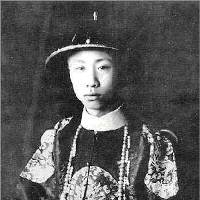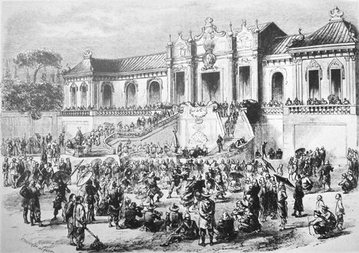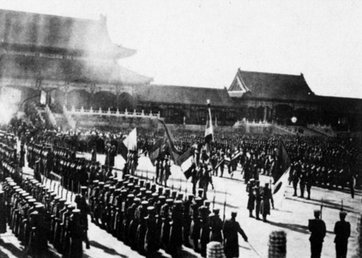Fall of Qing Dynasty and The Relations with Foreign Countries

The Last Emperor
After these 3 emperors, China went into a steady decline for over a century. One of the main reasons was the “Opium Wars”. They were two separate wars fought from 1839-1842 as the 1st Opium War and 1856-1860 as the 2nd Opium War. Opium is a type of addictive drug that makes people lazy and no longer want to work. The more someone takes the more he/she will want to smoke. The British traded the opium from India to China and soon it consumed the population, causing them to not wanting to work, therefore collapsing the economy and the weakening China. 100 million taels (silver currency) were consumed in terms of drugs. It was reported that at least 4 million, possibly 12 million Chinese people smoked Opium. China became heavily in debt.
“Lin Zexu”, an official in Southern China attempted to destroy Opium shipping to China. He arrested 1,700 opium dealers and destroyed 2.6 million pounds of opium, which was well over hundreds of thousands of dollars at that time. Even though he made the British mad and they eventually retaliated because of the heavy losses in Opium, he is still viewed as a hero today.
The 2nd Opium War is fought on the same issue, fighting over Opium. The Angle-French army eventually won several main battles against Qing and destroyed and looted “Old Summer Palace” also known as “Imperial Gardens”. Many beautiful collections of art, literature and architecture existed there. However, during the 2nd Opium War, most of the precious treasures were destroyed or lost.
In the late 19th century, China was forced to mass produce Opium in China. Almost 14 million people smoked it, causing massive failure in China’s economy. But not only Opium was used, there was heroin, cocaine and morphine in China that brought the downfall of China even closer.
“Empress Dowager Cixi” was one of the prominent figures of the late Qing Dynasty. She was born in 1835, and in 1851 he was brought to the Forbidden City to become one of the imperial Concubines of “Emperor Xianfeng”. Eventually, as the 2nd Opium War broke out, her son became “Emperor Tongzhi” after Xianfeng’s death. Cixi became the real power of the Qing government after she executed all the main administrators that disliked her or had a lot of power in the government. However, some important officials were still working in the government that had an idea of what was actually going on in the Empire, unlike Cixi. Emperor Guangxu eventually married, Cixi used this to announce that she would retire and give all her power to Guangxu, but instead she still had all the power. She just continued to use most of China’s treasury on improving the Summer Palace. Guangxu was eventually under house arrest by Cixi for over 2 years.
During her reign as the true ruler of China, there were many different wars going on that she pretty much ignored. There was the 2nd Opium War, the “Taping Rebellion” which led to the creation of “Heavenly Kingdom of Great Peace” and eventually the “1st Sino-Japanese War”. Heavenly Kingdom of Great Peace was created by “Hong Xiuquan”, a rebel leader that claimed he was the younger brother of Jesus. He ruled parts of Southern China with the population of 30 million. He changed the religion to Christianity and besieged Nanjing as his capital. The 1st Sino-Japanese War collapsed Qing’s military, and the extremely corrupted Empress Dowager Cixi made Qing Dynasty obsolete.
The “Eight-Nation Alliance” including, United States, France, Russia, Italy, Germany, Britain, Austria-Hungary and Japan planned out to siege Beijing which occurred on 1900, and even the Forbidden City was attacked and some important treasures were brought back to Europe. Cixi and Emperor Guangxu died 1 day after another in 1908 after escaping from Beijing. The last Emperor of China, “Xuantong Emperor” also known as “Puyi” was 2 years old when he sat on the Dragon Throne, he had no idea that he was the ruler of a fallen Empire, and in fact he was the last Emperor. He was numerously restored as Emperor of China and also Manchuria, but eventually he gave up. During his short rule of only 3 years as the last Emperor of China, “Xinhai Revolution” was one of the core events that really ended Qing. The people finally rebelled against the government and “Sun Yat-sen” and “Huang Xing” was the two leaders that ultimately created “Republic of China”. There were a few rebellions, the first ones failed but eventually it succeeds as Qing loses everything it had before. Puyi escaped to Manchuria and established “Manchukuo”, but after Communist China was officially established, he went back to China where he was in prison for 9 years. Eventually he got out in his 50s and lived rest of his life as an ordinary system. He passed away in 1967.
“Lin Zexu”, an official in Southern China attempted to destroy Opium shipping to China. He arrested 1,700 opium dealers and destroyed 2.6 million pounds of opium, which was well over hundreds of thousands of dollars at that time. Even though he made the British mad and they eventually retaliated because of the heavy losses in Opium, he is still viewed as a hero today.
The 2nd Opium War is fought on the same issue, fighting over Opium. The Angle-French army eventually won several main battles against Qing and destroyed and looted “Old Summer Palace” also known as “Imperial Gardens”. Many beautiful collections of art, literature and architecture existed there. However, during the 2nd Opium War, most of the precious treasures were destroyed or lost.
In the late 19th century, China was forced to mass produce Opium in China. Almost 14 million people smoked it, causing massive failure in China’s economy. But not only Opium was used, there was heroin, cocaine and morphine in China that brought the downfall of China even closer.
“Empress Dowager Cixi” was one of the prominent figures of the late Qing Dynasty. She was born in 1835, and in 1851 he was brought to the Forbidden City to become one of the imperial Concubines of “Emperor Xianfeng”. Eventually, as the 2nd Opium War broke out, her son became “Emperor Tongzhi” after Xianfeng’s death. Cixi became the real power of the Qing government after she executed all the main administrators that disliked her or had a lot of power in the government. However, some important officials were still working in the government that had an idea of what was actually going on in the Empire, unlike Cixi. Emperor Guangxu eventually married, Cixi used this to announce that she would retire and give all her power to Guangxu, but instead she still had all the power. She just continued to use most of China’s treasury on improving the Summer Palace. Guangxu was eventually under house arrest by Cixi for over 2 years.
During her reign as the true ruler of China, there were many different wars going on that she pretty much ignored. There was the 2nd Opium War, the “Taping Rebellion” which led to the creation of “Heavenly Kingdom of Great Peace” and eventually the “1st Sino-Japanese War”. Heavenly Kingdom of Great Peace was created by “Hong Xiuquan”, a rebel leader that claimed he was the younger brother of Jesus. He ruled parts of Southern China with the population of 30 million. He changed the religion to Christianity and besieged Nanjing as his capital. The 1st Sino-Japanese War collapsed Qing’s military, and the extremely corrupted Empress Dowager Cixi made Qing Dynasty obsolete.
The “Eight-Nation Alliance” including, United States, France, Russia, Italy, Germany, Britain, Austria-Hungary and Japan planned out to siege Beijing which occurred on 1900, and even the Forbidden City was attacked and some important treasures were brought back to Europe. Cixi and Emperor Guangxu died 1 day after another in 1908 after escaping from Beijing. The last Emperor of China, “Xuantong Emperor” also known as “Puyi” was 2 years old when he sat on the Dragon Throne, he had no idea that he was the ruler of a fallen Empire, and in fact he was the last Emperor. He was numerously restored as Emperor of China and also Manchuria, but eventually he gave up. During his short rule of only 3 years as the last Emperor of China, “Xinhai Revolution” was one of the core events that really ended Qing. The people finally rebelled against the government and “Sun Yat-sen” and “Huang Xing” was the two leaders that ultimately created “Republic of China”. There were a few rebellions, the first ones failed but eventually it succeeds as Qing loses everything it had before. Puyi escaped to Manchuria and established “Manchukuo”, but after Communist China was officially established, he went back to China where he was in prison for 9 years. Eventually he got out in his 50s and lived rest of his life as an ordinary system. He passed away in 1967.


